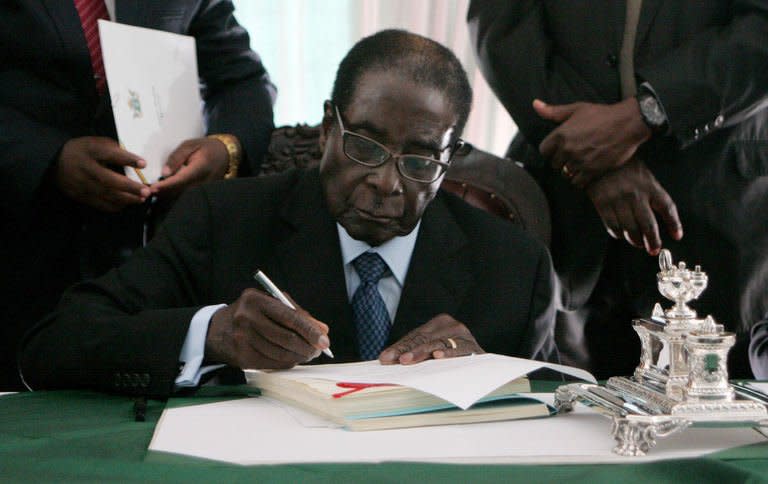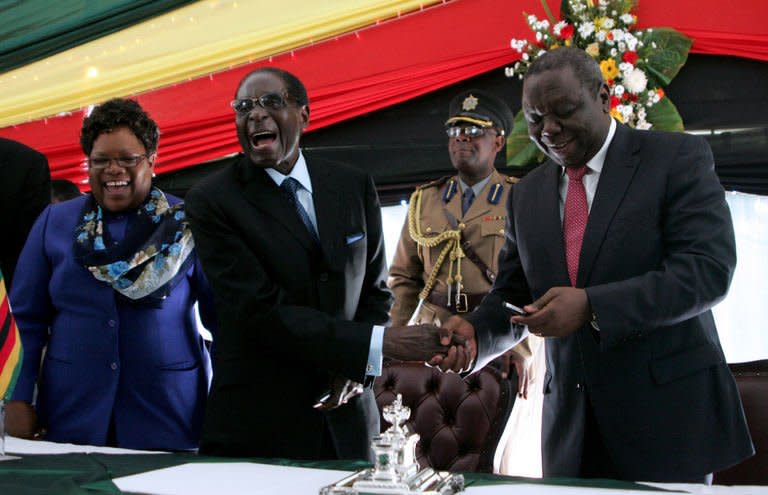Mugabe signs new Zimbabwe constitution into law
President Robert Mugabe signed Zimbabwe's new constitution into law Wednesday, clearing the path to crucial elections later this year. The 89-year-old, who has ruled Zimbabwe since independence from Britain in 1980, signed the document two months after it was overwhelmingly approved by Zimbabweans at a referendum. "This is a happening of joy, great joy indeed," Mugabe said at the signing ceremony, held in a marquee erected on the lush green lawns of the State House. Prime Minister Morgan Tsvangirai also welcomed the constitution's passage into law: "As Zimbabweans, we are proud that we are setting on a journey that is based on a new governance system." The supreme law replaces the one written in 1979 at Britain's Lancaster House. After Mugabe signed the text he shook hands with Tsvangirai, to loud applause from assembled ministers, lawmakers and the chief justice, saying "we want now to build the nation." "We will try to transform into a tomorrow that is more enjoyable, that is much more uplifting," said Mugabe. Despite the show of solidarity, the handshake effectively signals the start of an election campaign that will once again see the rivals pitted against each other. Tsvangirai has challenged Mugabe for the presidency twice before, with often bloody results. International observers described Mugabe's victory in 2002 as deeply flawed, and in 2008 the vote was plagued by violence and irregularities. After the latest poll, both men were forced into a shaky power-sharing government that has largely succeeded in preventing further unrest, but which has been hobbled by infighting. As part of a broader deal the pair were also pressed to adopt a new constitution that, now passed, significantly trims the president's powers and paves the way for fair elections. Presidents will now be limited to two five-year terms and the post of prime minister will be scrapped when a new government is voted in. But there are doubts that reforms can be implemented quickly enough to ensure a fair election. Mugabe's 33-year-rule, at first lauded as enlightened, has in recent decades been tainted by rights abuses against his opponents and critics. The arrest and persecution of opposition and rights activists has continued apace as election day approaches. The polls should be held this year, but the date is yet to be set. Mugabe and his allies want the polls as soon as possible while Tsvangirai insists on the application of key reforms first to ensure a free and fair vote. The polls however face funding uncertainty in the cash-strapped country, with Finance Minister Tendai Biti saying it cannot afford the estimated $132 million price tag. The government had initially approached the United Nations for financial help, but withdrew the request when it was made clear the cash was conditional on the deployment of international observers. As the United Nations prepared to send a team to appraise the situation on the ground, a key Mugabe ally -- Justice Minister Patrick Chinamasa -- declared that the team had overstepped its mandate by planning to meet civil society groups. Zimbabwe has also approached South Africa for money to help organise the elections, while the government is also try to raise funds on the domestic front. Some critics had raised concern that the majority of Zimbabweans voted for the constitution blindly because there was little time to decipher and understand its provisions. Now that it is law, "we are faced as Zimbabweans with the grim reality of living out something we did not understand," said Takura Zhangazha, an independent political analyst.



